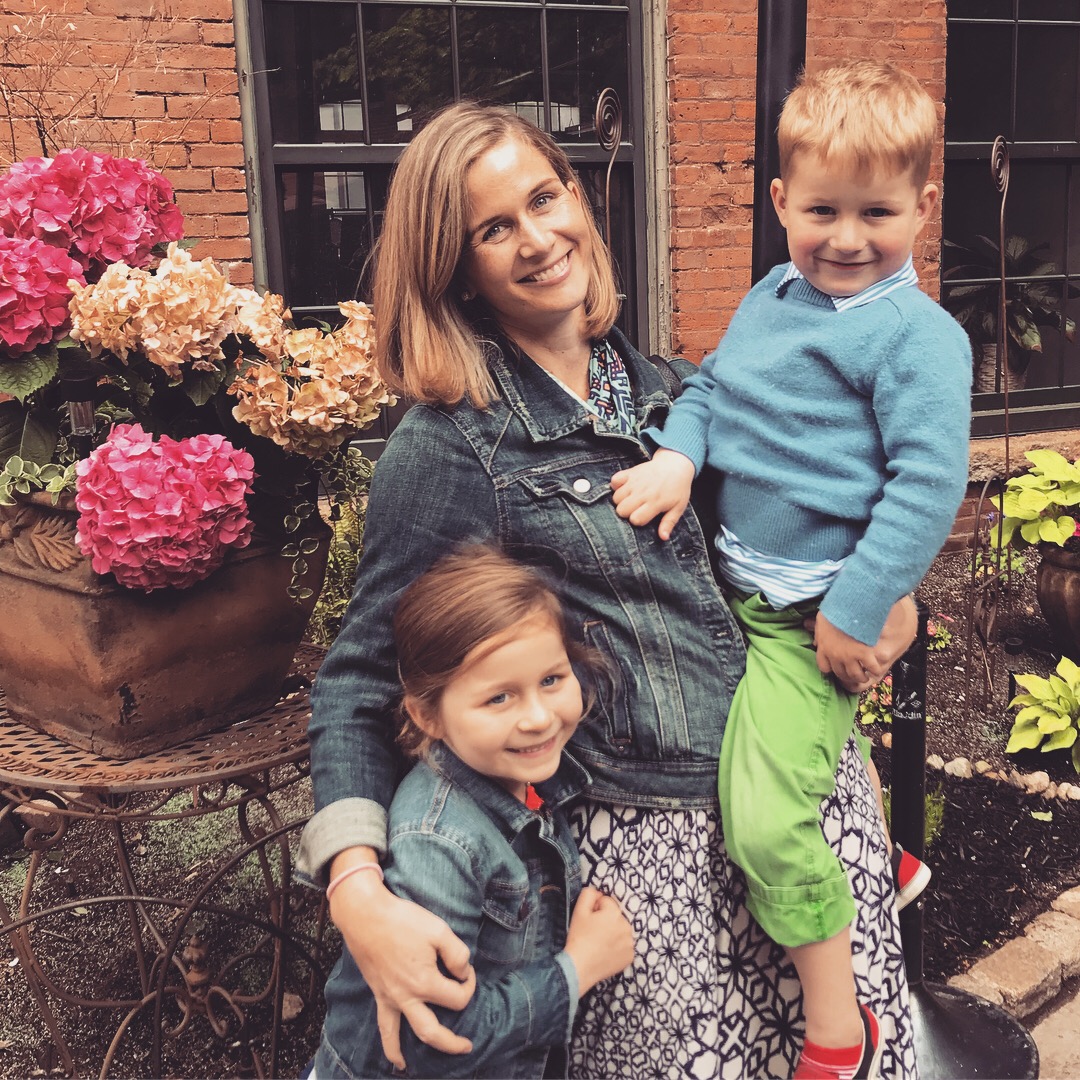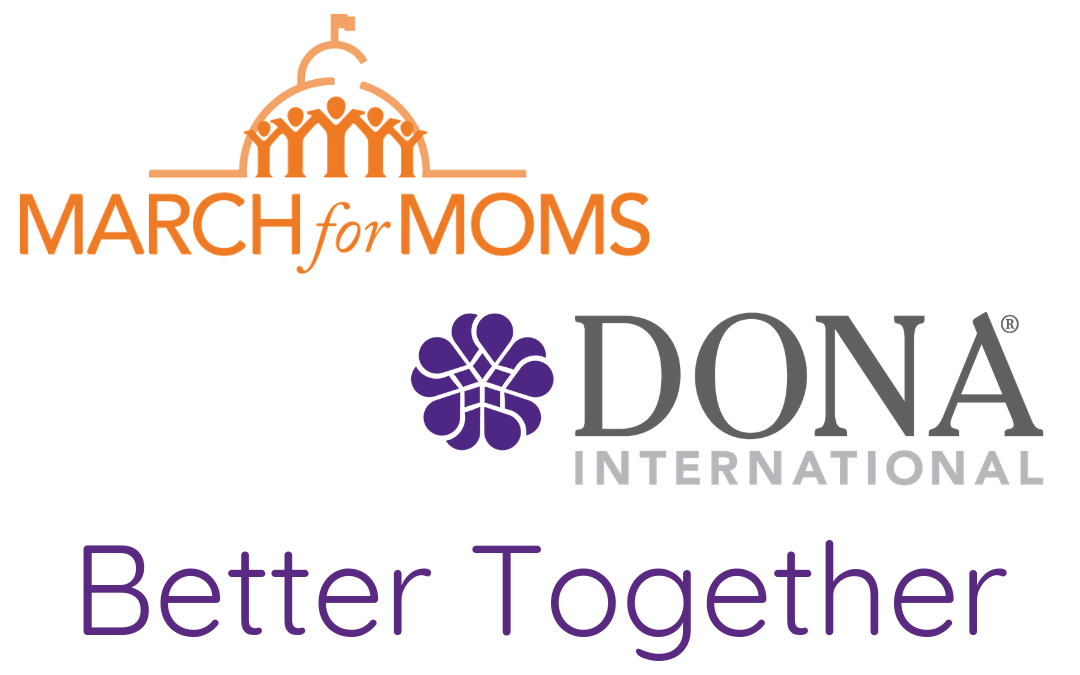Introduction to March for Moms
March for Moms (MfM) is gearing up for their third annual event on the National Mall in Washington DC, to rally and raise awareness of maternal mortality and morbidity in the United States in the childbearing year. On Saturday, May 11th, from 1-3 PM, perinatal organizations including DONA International will join with MfM leadership, other advocates for safe birth, perinatal professionals and consumers to stand up and say that enough is enough and not one more parent should experience a complication or death from childbirth that could have been prevented. It is estimated that currently, 50% of all maternal deaths in the United States are preventable.
Despite the United States being a wealthy and amazingly resourced country, the number of people dying as a result of pregnancy or birth continues to climb. A person who is pregnant in 2019 is twice as likely to die as a result of being pregnant or giving birth compared to someone who birthed in 1987. Black women are dying at even higher rates.
March for Moms leads the way in advocating and raising awareness of many of the very real issues that families face, including perinatal depression, premature births, health inequities and disparities, poor family leave programs, and lack of healthcare options in many places in the country. In addition to their March on the National Mall, March for Moms also encourages and supports advocacy with politicians on the local, state and national level.
May 10th, the day before the rally on the Mall, March for Moms supporters will be visiting senators and representatives on Capitol Hill to share information about the importance of legislation and funding for maternal-infant health issues across the United States.
In early March, March for Moms named Katherine Shea Barrett as the founding Executive Director of the organization. Her appointment means the organization is positioned to move its advocacy to the next level and increase the impact of their efforts with the support of the Board of Directors.
Meet Katherine Shea Barrett
I had the opportunity to check in with Katherine “Katie” Barrett and ask some questions about where March for Moms is headed and how doulas and DONA International might be able to play a role.
Sharon Muza: You are the first ED of this fairly young organization, March for Moms (MfM). What excites you about this opportunity and commitment both for yourself and the MfM organization?
 Katherine Shea Barrett: As a mother to two little kids, I understand from firsthand experience that childbirth can be stressful, socially isolating, and even mortally dangerous—and also that it doesn’t have to be this way. Every person should be able to grow their family safely, and with dignity. I am truly excited to build on the momentum this organization has garnered from the two March for Moms events that have occurred on the Mall to catalyze action to improve the well-being of every American mother!
Katherine Shea Barrett: As a mother to two little kids, I understand from firsthand experience that childbirth can be stressful, socially isolating, and even mortally dangerous—and also that it doesn’t have to be this way. Every person should be able to grow their family safely, and with dignity. I am truly excited to build on the momentum this organization has garnered from the two March for Moms events that have occurred on the Mall to catalyze action to improve the well-being of every American mother!
SM: The MfM organization is three years old, and in this time, both the growth and the impact have been remarkable. This organization, started just a few short years ago by caring and concerned professionals and consumers, is now firmly established as a leader for maternal-infant health issues. What are your hopes for the next few years and then more long term for the MfM organization?
KSB: I hope that we can work together as an organization and with partner organizations like DONA International to define a clear vision for what maternal well-being looks like in the United States and a tactical policy and practice agenda to make that vision a reality. In the short term, March for Moms needs to develop a three-year strategic plan and fundraise to become a sustainable organization. In the longer term, I hope March for Moms can play the critical role of bringing moms together with clinical, professional, payers and purchasers of care to truly transform not only the birth experience but the experience of growing one’s family.
SM: It has long been known that families of color have worse outcomes for both parents and babies. What is MfM doing to keep this issue in the forefront and center the voices of those most adversely impacted?
KSB: The issues of maternal mortality and respect and dignity in childbirth for people of color are central to March for Mom’s mission and work. To start, two of our board members, Ebony Marcelle and Chanel Porchia-Albert, have really led on the need for racial equity in childbirth, both at the local and national levels. Ebony is a director of the Community of Hope birth center and serves on the Maternal Mortality Review Committee in Washington, DC. Chanel is the founder of Ancient Song Doula Services and has been particularly active in promoting equity in New York City, where black women are twelve times more likely to die in childbirth than white women.
SM: Most people know MfM for their Washington DC events (public gathering and Hill Day) in May of each year. What is MfM doing throughout the year to further their mission and keep the progress moving forward?
KSB: Advocating for maternal well-being is a year-round endeavor! To start, we are hoping to get cities, states and ultimately the federal government to declare the week before Mother’s Day “National Maternal Health Week” to bring even more awareness to the crisis of maternal well-being facing the U.S. today. Beyond May, March for Moms will be developing programs to grow and support our community of advocates year-round. As we define our organizational strategy and three-year plan, we will get more detailed about how to keep the pressure on improving maternal well-being.
SM: If interested people are unable to attend the DC events in May, what can they be doing in their own communities to raise awareness and increase support for maternal-infant health in May, and all year long?
KSB: First, please follow March for Moms on social media and help share the messages to your networks! Second, we appreciate any level of support, even $5 furthers our mission as a grassroots organization (plus we have great T-shirts on our website).
There are also so many ways to continue to raise awareness in your community. Our advocacy training is online this year! The training includes an overview of the MOMS and MOMMAS Acts at the federal level for which March for Moms is advocating. We have also created an interactive map to identify policies state by state on three of our priority areas: 1) paid family leave, 2) development of maternal mortality review commissions (MMRC), and 3) improved perinatal mental health (e.g. universal screening for maternal depression and resources to improve coordination and provision of behavioral health services for moms). So interested people can check out where their state stands on those policies and get the training to be an effective advocate to drive change!
We will also be putting out on social media a variety of ways for people to get involved on the Hill day and the March day by tweeting, texting and calling from wherever they are – so stay tuned!
 SM: What role do you think doulas play (or will play) in improving maternal and neonatal mortality and morbidity, especially for the most vulnerable populations – families of color?
SM: What role do you think doulas play (or will play) in improving maternal and neonatal mortality and morbidity, especially for the most vulnerable populations – families of color?
KSB: I worked with a doula when I gave birth and understand the critical role doulas can play from first-hand experience. Research has also demonstrated clearly that doulas play an important role in improving maternal outcomes and well-being, particularly for families of color. I know that supporting policy changes to scale and sustain the use of doulas in birth and supporting moms before and after birth – and supporting practice changes to make doulas a central part of every birth team in collaboration with midwifery and OB/GYN professional organizations – will be a component of March for Mom’s agenda. We are so excited to continue to partner with DONA as an organization, and I’m really looking forward to learning from you all as I take on this new role.
Conclusion
Please join DONA International, professional organizations, families, and March for Moms in Washington DC May 10th and 11th to stand up for parents and infants and advocate for the best care and policies possible so that families have everything they need to start off healthy and happy. Alternately, please consider making an effort to connect with your local politicians so that they clearly understand how important proper funding and legislation is to families in your communities.


